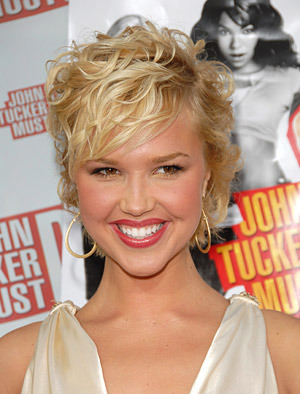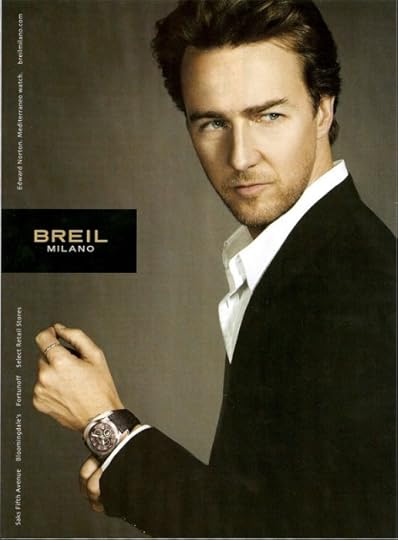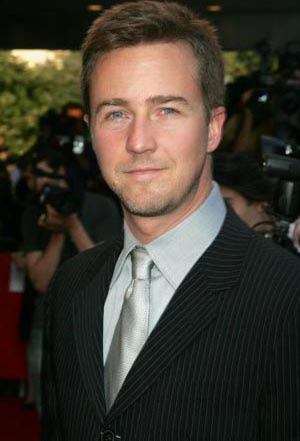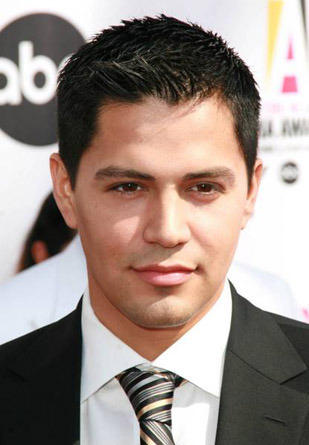Becca Fitzpatrick's Blog, page 2
February 18, 2011
Dream cast
First, a disclaimer. This is my HUSH, HUSH saga dream cast as of this exact moment. Likely, by tomorrow, I will have changed my mind. So if two months from now you read an interview where I mention a completely different list of actors, don't blame me. Blame my indecisiveness. Also, I want to make it very clear I have not sold the movie rights to HUSH, HUSH so this dream cast is just that...a dream cast.
One more thing. I left out Patch intentionally. Read into that however you like.
First up, Leighton Meester as Nora Grey.
Arielle Kebbel as Vee Sky. Only she'd need to gain about forty pounds...
AnnaSophia Robb as Marcie Millar
Channing Tatum as Scott Parnell
Emma Stone as Dabria
Ed Norton as Hank Millar
Louis Prades as Rixon. Only Irish, not French.
Gaspard Ulliel as Chauncey Langeais.
Jay Hernandez as Detective Basso
Dream cast
First, a disclaimer. This is my HUSH, HUSH saga dream cast as of this exact moment. Likely, by tomorrow, I will have changed my mind. So if two months from now you read an interview where I mention a completely different list of actors, don't blame me. Blame my indecisiveness. Also, I want to make it very clear I have not sold the movie rights to HUSH, HUSH so this dream cast is just that...a dream cast.
One more thing. I left out Patch intentionally. Read into that however you like.
First up, Leighton Meester as Nora Grey.
Arielle Kebbel as Vee Sky. Only she'd need to gain about forty pounds...
AnnaSophia Robb as Marcie Millar
Channing Tatum as Scott Parnell
Emma Stone as Dabria
Ed Norton as Hank Millar
Louis Prades as Rixon. Only Irish, not French.
Gaspard Ulliel as Chauncey Langeais.
Jay Hernandez as Detective Basso
February 17, 2011
Suck it up
In high school I ran cross-country and track. I remember liking all of my coaches, but there were a couple I truly loved. Coach Edwards instantly comes to mind. Every day after school, Coach Edwards met us on the track wearing a royal-blue windbreaker and too-short shorts (no offense, Coach). My teammates and I never knew what Coach had in store. Sometimes he'd send us on a relatively easy eight-mile run. Other times, he'd take us to one of a handful of viaducts in town and make us run hills. (Yes, in Nebraska, the hills are man-made.) My least favorite practices were when Coach made us run ladders, otherwise known as interval training. Ladders were, by far, the hardest part of our training.
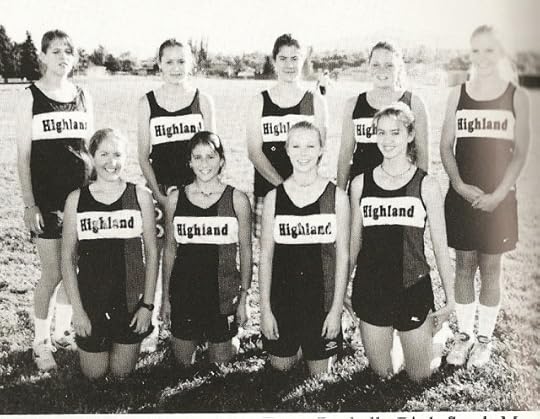
Halfway through a ladder workout, I was sucking air, red in the face, and my thoughts turned negative. The mere idea of sprinting another 400 meters had the power to break me. At this point, the lowest of all, Coach gave us a pep talk. His pep talks were always the same and consisted of three words. Suck. It. Up.
He didn't say it in a demeaning voice. Rather, he said it with encouragement. Suck it up. Do what needs to be done. This is where runners are separated from champions.
Even though I think he'd be surprised to hear it, I've applied Coach's advice to several areas of my life over the years. Most recently, I've applied it to writing. Just like I used to show up at track practice with no idea what was in store, I often sit down at my computer with no idea what kind of writing day I'll have. Some days are easy, and the words flow. Some days I run into brick wall after brick wall. Some days I feel utterly overwhelmed and wonder if I'm really meant to write.
For me, the most overwhelming day of the year is always that very first day when the Editorial Letter arrives. Editorial letters can be anywhere from one page in length to twenty. Maybe even more. The letter comes directly from the editor and its purpose is to give the author a blueprint for revisions. But the day I receive the letter, that's not what I see. I see page after page detailing every last thing that is wrong with my novel. The letter screams, YOUR NOVEL SUCKS!
I remember when HUSH, HUSH's editorial letter arrived. I believe it was about four pages long. The edits took three grueling weeks to complete. I was shocked by the amount of scenes my editor wanted me to either tweak, rewrite or cut. I truly believed she was asking me to edit the story beyond recognition.
Fast forward to CRESCENDO. I didn't exactly receive an editorial letter with this book. Instead, my editor Skyped me, and we talked for hours. In retrospect, I think there was so much wrong with the story, it was easier to hash it out face-to-face rather than put it down on paper. Likely, the letter itself would have been longer than the book! By the end of the Skype call, I had scribbled pages of notes. Change entire mystery thread. Change identity of villain. Create rift between character A and character B. Character C needs a boyfriend. Drop this whole plot thread. Ax this scene. Need more tension here. I sobbed. Instead of a quick three-week edit, I spent months rewriting CRESCENDO. And every day of every one of those months I gave myself a pep talk.
Suck it up.
Now I'm anxiously awaiting my editorial letter for SILENCE. Interestingly enough, I'm not as apprehensive as maybe I should be. I feel like I learned a lot during the editing of CRESCENDO, and even though I never thought I'd say this, I'm glad I had to go through it. It made me improve, as work always does. And I'm determined not to make the same mistakes again, ha!
I know a good portion of my blog readers are also writers, so in the spirit of Coach Edwards, no matter where you stand with your current manuscript, SUCK IT UP. And I mean that with buckets of love and encouragement. Most of all, I mean it for myself.
For more of my thoughts on editorial letters, go here.
Suck it up
In high school I ran cross-country and track. I remember liking all of my coaches, but there were a couple I truly loved. Coach Edwards instantly comes to mind. Every day after school, Coach Edwards met us on the track wearing a royal-blue windbreaker and too-short shorts (no offense, Coach). My teammates and I never knew what Coach had in store. Sometimes he'd send us on a relatively easy eight-mile run. Other times, he'd take us to one of a handful of viaducts in town and make us run hills. (Yes, in Nebraska, the hills are man-made.) My least favorite practices were when Coach made us run ladders, otherwise known as interval training. Ladders were, by far, the hardest part of our training.
[image error]
Halfway through a ladder workout, I was sucking air, red in the face, and my thoughts turned negative. The mere idea of sprinting another 400 meters had the power to break me. At this point, the lowest of all, Coach gave us a pep talk. His pep talks were always the same and consisted of three words. Suck. It. Up.
He didn't say it in a demeaning voice. Rather, he said it with encouragement. Suck it up. Do what needs to be done. This is where runners are separated from champions.
Even though I think he'd be surprised to hear it, I've applied Coach's advice to several areas of my life over the years. Most recently, I've applied it to writing. Just like I used to show up at track practice with no idea what was in store, I often sit down at my computer with no idea what kind of writing day I'll have. Some days are easy, and the words flow. Some days I run into brick wall after brick wall. Some days I feel utterly overwhelmed and wonder if I'm really meant to write.
For me, the most overwhelming day of the year is always that very first day when the Editorial Letter arrives. Editorial letters can be anywhere from one page in length to twenty. Maybe even more. The letter comes directly from the editor and its purpose is to give the author a blueprint for revisions. But the day I receive the letter, that's not what I see. I see page after page detailing every last thing that is wrong with my novel. The letter screams, YOUR NOVEL SUCKS!
I remember when HUSH, HUSH's editorial letter arrived. I believe it was about four pages long. The edits took three grueling weeks to complete. I was shocked by the amount of scenes my editor wanted me to either tweak, rewrite or cut. I truly believed she was asking me to edit the story beyond recognition.
Fast forward to CRESCENDO. I didn't exactly receive an editorial letter with this book. Instead, my editor Skyped me, and we talked for hours. In retrospect, I think there was so much wrong with the story, it was easier to hash it out face-to-face rather than put it down on paper. Likely, the letter itself would have been longer than the book! By the end of the Skype call, I had scribbled pages of notes. Change entire mystery thread. Change identity of villain. Create rift between character A and character B. Character C needs a boyfriend. Drop this whole plot thread. Ax this scene. Need more tension here. I sobbed. Instead of a quick three-week edit, I spent months rewriting CRESCENDO. And every day of every one of those months I gave myself a pep talk.
Suck it up.
Now I'm anxiously awaiting my editorial letter for SILENCE. Interestingly enough, I'm not as apprehensive as maybe I should be. I feel like I learned a lot during the editing of CRESCENDO, and even though I never thought I'd say this, I'm glad I had to go through it. It made me improve, as work always does. And I'm determined not to make the same mistakes again, ha!
I know a good portion of my blog readers are also writers, so in the spirit of Coach Edwards, no matter where you stand with your current manuscript, SUCK IT UP. And I mean that with buckets of love and encouragement. Most of all, I mean it for myself.
For more of my thoughts on editorial letters, go here.
Be nice
I sat down at my computer tonight intending to write about general writing tips, but thought I'd breeze over to Twitter first, just in case I was missing out on ground-breaking news. Like, you know, Borders filing for bankruptcy. I could wax poetic on my feelings on that subject, but since I'm an author and a reader, I figure my stance is probably pretty obvious. But back to the subject at hand. Before starting this post, I swung by Twitter and discovered a link to a blog Lilith Saintcrow wrote in September 2006 on why the hard sell doesn't work. She gave several excellent tips on breaking into the publishing industry, and if that's your goal, I'd highly recommend reading the entire post. Here's a link. One part of her post in particular stood out to me, and I'm going to quote it here:
“Publishing is really a small business. You never know when the person you’re rude to on a convention panel or in an elevator at a trade show may hold the power of life or death over your wee manuscript in the future. It’s best to be tactful and interested in other people at cons and shows, not to mention writer’s group meetings.” --Lilith Saintcrow
Publishing is a small business. Simply put, everyone knows everyone. Instead of the “Six degrees of Kevin Bacon” we play the “Six degrees of Julie Strauss-Gabel.”
But back to writing tips. Since I turned SILENCE in to my editor last week, I've been playing catch-up with my email. One of the most popular questions I'm seeing is some form of this: “I'm an aspiring author and I was wondering if you could share tips on writing and breaking into the industry?”
This is a tough question to answer. I always feel like I need more information before I can give a solid answer. Often, I want to write back with a few questions of my own. Are you an aspiring author with a seed of an idea, or do you have a finished manuscript? Are you part of a critique group, and have the members given you feedback on your manuscript? Do you know what a query letter is? (It's fine if you don't, it just means my answer will be different.) Do you have an agent?
Regardless of the answers to these questions, I think there is one piece of advice that is universal, no matter where you find yourself on the path to publication. And that is: be nice. Be courteous. Be generous. As Lilith Saintcrow says, Be tactful. Be interested.
Be humble.
Let me tell you a story. In the weeks leading up to HUSH, HUSH's publication, I thought reading early reviews of the book would be helpful. Or maybe I didn't even think that. Maybe it all boiled down to simple curiosity. But whatever the reason, I frequently visited Goodreads and Amazon, determined to learn what people thought of my book. As you might expect, there were glowing reviews, mediocre reviews, and scathing reviews. One particular review that fell into the latter category caught my eye. I stewed over it for a few days, and eventually forgot about it.
Fast forward several months. An email arrived from an editor asking if I'd be interested in reading a manuscript. If you're two steps ahead, you might have already guessed that the author of the manuscript was none other than the author of the scathing review I had, up until this point, forgotten about. The editor introduced herself and made the comment that her author adored HUSH, HUSH and would love if I'd read her book with an eye toward writing a blurb. It was an awkward situation, to say the least. In the end, I did the only thing I felt appropriate: I laughed it off, then politely informed the editor I was swamped and unable to read the manuscript, but thanked her for thinking of me.
You might think I turned down reading the manuscript out of revenge or to give the author the finger, so to speak. I hope I'm not that petty. The reason I decided not to read the manuscript was because I wondered what would happen if I did read it...and loved it. What if I sent the editor a handful of glowing words, and she decided to stick them on the front cover of her author's book? Would the author love having my praise splashed on her cover? Probably not. In the end, I decided to take the higher road and let the author breathe easy. (It didn't slip my mind that the ultimate revenge would have been making sure my name got on the cover of her book. But again. Higher road. Always the better path.)
Interestingly enough, this once-aspiring author didn't limit her somewhat rantish reviews to HUSH, HUSH. She'd made quite a habit of belittling authors' books along the way, and I suppose it comes to no surprise that, as far as I know, she was never able to find an author to blurb her book. This isn't to say an aspiring author can't be honest when writing reviews, but if your goal is to be published, it might serve you well to drop the books you don't love, and talk up the ones you do. You don't have to love every book, every time. But I think a bit of courtesy in saying, “This wasn't for me, and here's why,” says volumes about you as a reviewer and a person. No one wants to start their career surrounded by nothing but a lot of burned bridges.
Whether you believe in karma, the Golden Rule, or the old saying, “What goes around comes around,” all have stood the test of time. If you want agents, editors and authors to respect you, take the first step. Extend kind words. Talk up books you love. Be polite and respectful at conferences. Attend author book signings. All of these things will go along way.
So, yes. That's my writing tip of the day. Be nice.
February 16, 2011
Be nice
I sat down at my computer tonight intending to write about general writing tips, but thought I'd breeze over to Twitter first, just in case I was missing out on ground-breaking news. Like, you know, Borders filing for bankruptcy. I could wax poetic on my feelings on that subject, but since I'm an author and a reader, I figure my stance is probably pretty obvious. But back to the subject at hand. Before starting this post, I swung by Twitter and discovered a link to a blog Lilith Saintcrow wrote in September 2006 on why the hard sell doesn't work. She gave several excellent tips on breaking into the publishing industry, and if that's your goal, I'd highly recommend reading the entire post. Here's a link. One part of her post in particular stood out to me, and I'm going to quote it here:
“Publishing is really a small business. You never know when the person you’re rude to on a convention panel or in an elevator at a trade show may hold the power of life or death over your wee manuscript in the future. It’s best to be tactful and interested in other people at cons and shows, not to mention writer’s group meetings.” --Lilith Saintcrow
Publishing is a small business. Simply put, everyone knows everyone. Instead of the “Six degrees of Kevin Bacon” we play the “Six degrees of Julie Strauss-Gabel.”
But back to writing, or rather, publishing tips. Since I turned SILENCE in to my editor last week, I've been playing catch-up with my email. One of the most popular questions I'm seeing is some form of this: “I'm an aspiring author and I was wondering if you could share tips on writing and breaking into the industry?”
This is a tough question to answer. I always feel like I need more information before I can give a solid answer. Often, I want to write back with a few questions of my own. Are you an aspiring author with a seed of an idea, or do you have a finished manuscript? Are you part of a critique group, and have the members given you feedback on your manuscript? Do you know what a query letter is? (It's fine if you don't, it just means my answer will be different.) Do you have an agent?
Regardless of the answers to these questions, I think there is one piece of advice that is universal, no matter where you find yourself on the path to publication. And that is: be nice. Be courteous. Be generous. As Lilith Saintcrow says, Be tactful. Be interested.
Be humble.
Let me tell you a story. In the weeks leading up to HUSH, HUSH's publication, I thought reading early reviews of the book would be helpful. Or maybe I didn't even think that. Maybe it all boiled down to simple curiosity. But whatever the reason, I frequently visited Goodreads and Amazon, determined to learn what people thought of my book. As you might expect, there were glowing reviews, mediocre reviews, and scathing reviews. One particular review that fell into the latter category caught my eye. I stewed over it for a few days, and eventually forgot about it.
Fast forward several months. An email arrived from an editor asking if I'd be interested in reading a manuscript. If you're two steps ahead, you might have already guessed that the author of the manuscript was none other than the author of the scathing review I had, up until this point, forgotten about. The editor introduced herself and made the comment that her author adored HUSH, HUSH and would love if I'd read her book with an eye toward writing a blurb. It was an awkward situation, to say the least. In the end, I did the only thing I felt appropriate: I laughed it off, then politely informed the editor I was swamped and unable to read the manuscript, but thanked her for thinking of me.
You might think I turned down reading the manuscript out of revenge or to give the author the finger, so to speak. I hope I'm not that petty. The reason I decided not to read the manuscript was because I wondered what would happen if I did read it...and loved it. What if I sent the editor a handful of glowing words, and she decided to stick them on the front cover of her author's book? Would the author love having my praise splashed on her cover? Probably not. In the end, I decided to take the higher road and let the author breathe easy. (It didn't slip my mind that the ultimate revenge would have been making sure my name got on the cover of her book. But again. Higher road. Always the better path.)
Interestingly enough, this once-aspiring author didn't limit her somewhat rantish reviews to HUSH, HUSH. She'd made quite a habit of belittling authors' books along the way, and I suppose it comes to no surprise that, as far as I know, she was never able to find an author to blurb her book. This isn't to say an aspiring author can't be honest when writing reviews, but if your goal is to be published, it might serve you well to drop the books you don't love, and talk up the ones you do. You don't have to love every book, every time. But I think a bit of courtesy in saying, “This wasn't for me, and here's why,” says volumes about you as a reviewer and a person. No one wants to start their career surrounded by nothing but a lot of burned bridges.
Whether you believe in karma, the Golden Rule, or the old saying, “What goes around comes around,” all have stood the test of time. If you want agents, editors and authors to respect you, take the first step. Extend kind words. Talk up books you love. Be polite and respectful at conferences. Attend author book signings. All of these things will go along way.
So, yes. That's my publishing tip of the day. Be nice.
February 11, 2011
Angeli nell' Ombra
SILENCE
Hi guys!
At long last! I am thrilled to finally announce the title of the third book in the Hush, Hush saga! If you follow me on Twitter, or if you're a fan of my Facebook page, you've probably noticed there has been (just a little!) drama surrounding this title recently. Ever since I decided Tempest wasn't the right title for the book, I've been on the search for a worthy replacement. I spent weeks sorting through titles and, in the end, for one reason or another, none of them felt right.
I always thought the title of the third book would be loud— something a crescendo would build up to. And it made sense; the storyline of the third book is daring and twisty and oh so romantic. Which is why I was surprised to find, in the end, the title I chose isn't flashy or loud or culminating. Instead, it's a haunting word, quietly powerful, filled with mystery and beauty. A word that means to put doubt, fear and anxiety to rest. A word that is synonymous with stillness, secrecy and all that is forgotten.
The noise between Patch and Nora is gone in this book. They've overcome the secrets riddled in Patch's dark past...bridged two irreconcilable worlds...faced heart-wrenching tests of betrayal, loyalty and trust...and all for a love that will transcend the boundary between heaven and earth. Armed with nothing but their absolute faith in one another, Patch and Nora enter a desperate fight to stop a villain who holds the power to shatter everything they've worked for—and their love—forever.
With much pleasure, I give you the title of the third book...
SILENCE.
February 10, 2011
Angeli nell' Ombra
SILENCE
Hi guys!
At long last! I am thrilled to finally announce the title of the third book in the Hush, Hush saga! If you follow me on Twitter, or if you're a fan of my Facebook page, you've probably noticed there has been (just a little!) drama surrounding this title recently. Ever since I decided Tempest wasn't the right title for the book, I've been on the search for a worthy replacement. I spent weeks sorting through titles and, in the end, for one reason or another, none of them felt right.
I always thought the title of the third book would be loud— something a crescendo would build up to. And it made sense; the storyline of the third book is daring and twisty and oh so romantic. Which is why I was surprised to find, in the end, the title I chose isn't flashy or loud or culminating. Instead, it's a haunting word, quietly powerful, filled with mystery and beauty. A word that means to put doubt, fear and anxiety to rest. A word that is synonymous with stillness, secrecy and all that is forgotten.
The noise between Patch and Nora is gone in this book. They've overcome the secrets riddled in Patch's dark past...bridged two irreconcilable worlds...faced heart-wrenching tests of betrayal, loyalty and trust...and all for a love that will transcend the boundary between heaven and earth. Armed with nothing but their absolute faith in one another, Patch and Nora enter a desperate fight to stop a villain who holds the power to shatter everything they've worked for—and their love—forever.
With much pleasure, I give you the title of the third book...
SILENCE.




